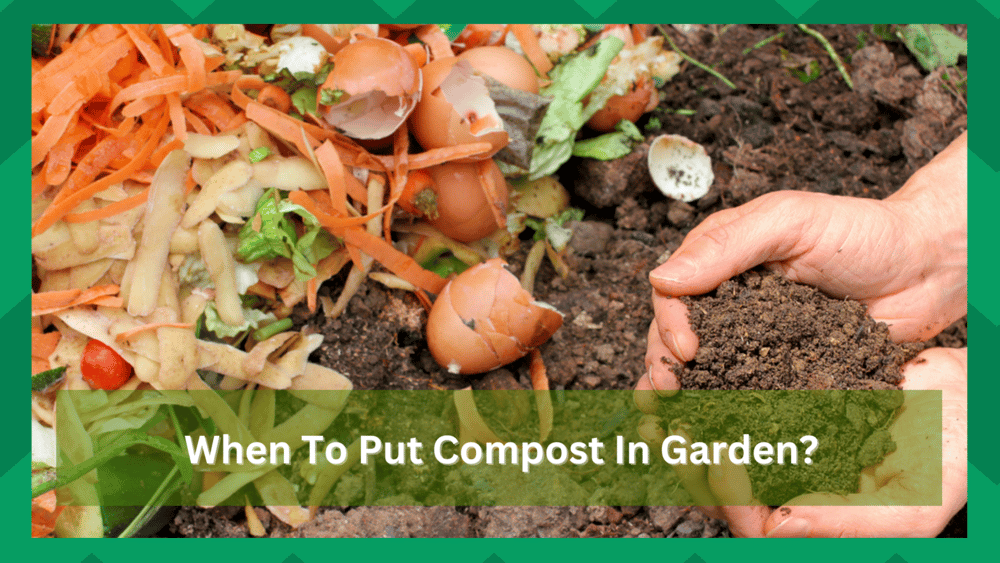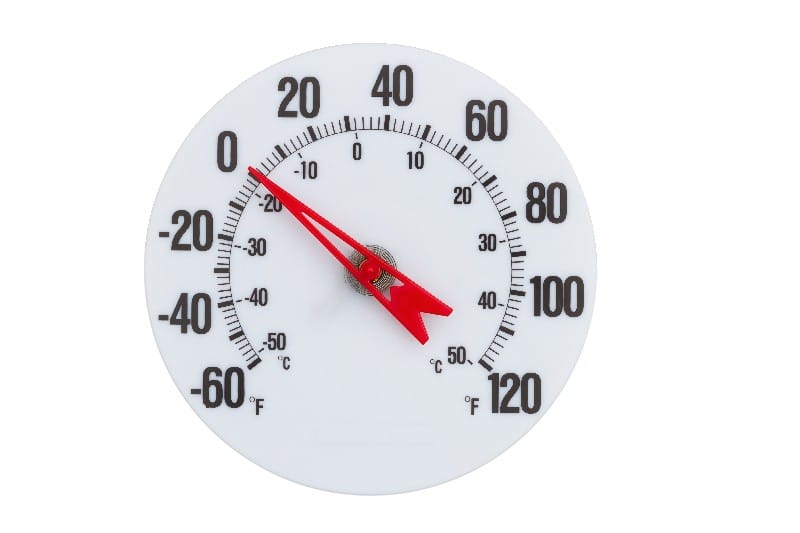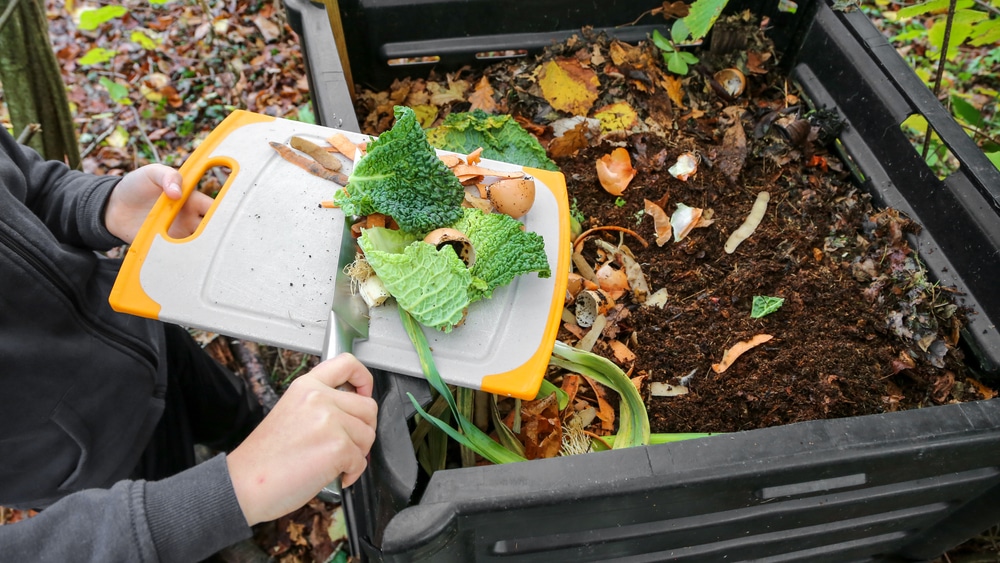
Composting is one of the best ways to recycle while taking care of your plants. The compost mixture can boost the growth of your garden. As long as you avoid using meat and other cooked items in your compost mixture, it won’t smell foul and work perfectly for your plants.
You can easily maintain an outdoor compost pile with a large garden. We have noticed many gardeners are confused about when to put compost. Let’s cover this topic briefly to help you make a better decision for your garden.
When To Put Compost on Garden: A Brief Guide
While deciding when to put compost in the garden, you must primarily think about the weather. If you add the compost in autumn and there are heavy rain and winter storms afterward, the nutrients from the compost will be leached by the rainwater.
Moreover, the microbial and worm activity in the soil will slow down. So, you will have to keep these things in mind while adding compost to the garden. If you don’t pick the right season, you won’t be able to increase the life of your soil.
To avoid this outcome, we suggest you refer to a local expert. He will know more about the climatic conditions and the best time to put compost in the garden. Most people prefer to use compost mid-summer or spring to increase the life of the soil.
However, you must ask a local expert about the best time to use compost if you live in extreme weather conditions. You can’t follow the same strategy as other people because of the difference in environmental conditions.
The nutrients in the compost get absorbed in the rainwater. When the water washes away, the effectiveness and benefit of your compost reduce by a substantial margin. This is why most gardeners prefer summertime for managing their compost needs.
You want to choose a time when the temperature is not that extreme, and your worms can survive. Moreover, you should refrain from using compost when it rains a lot. Managing compost should be fine if you avoid these two outcomes.
You can introduce it as a top dressing on your old plants and add it next to the roots of plants that you’re just adding to the garden. That way, your plants can get the most benefit from the compost.
Does it matter what season you compost your garden?
Composting your garden is a great way to add essential nutrients back into the soil, reduce the amount of waste going to landfills, and improve the helpful microorganisms in your soil.
But does it matter what season you compost your garden? The answer is yes—different seasons present different conditions for composting and will determine how effective your compost is.
In the fall, cooler temperatures mean that some microorganisms in your compost pile may become dormant, leading to a slower composting process.
As such, it’s important to be aware of moisture levels when you compost in the fall and make sure your compost pile remains moist yet not too wet—if there’s too much moisture, you run the risk of anaerobic bacteria forming, which will produce odors and inhibit the composting process.
Any leaves or debris you want to add as part of your compost should be chopped up into small pieces before adding them to speed up the composting process.
In the winter, cold temperatures will further slow the decomposition process. To help speed things up a bit, make sure to add some fresh green material (such as food scraps) and dry brown materials like leaves and straw to provide carbon for the microorganisms to feed on.
Covering your compost pile with a tarp or burlap sack can also help to retain heat and further speed up the composting process.
During the spring, warmer temperatures speed up the decomposition process, which is a great time to start your compost pile or add material to an existing one.
Be sure to mix fresh green and dry brown materials like leaves and straw to give your compost the right balance of carbon and nitrogen.
You may also want to mix in some soil or finished compost from previous batches to help inoculate your pile with beneficial microbes that will speed up the decomposition process.
In the summer, hot temperatures can dry out your compost pile, slowing decomposition. Be sure to add moisture to your compost pile and cover it with a tarp or burlap sack to retain as much heat as possible.
Understanding the different environmental conditions that come with each season can help you ensure your garden compost is effective no matter what time of year you’re doing it.
By making the necessary adjustments to your compost pile, you can ensure that you’re adding essential nutrients back into the soil and improving your garden’s overall health.
What to avoid when Composting your Garden?
Composting is an excellent way to reduce waste, improve soil quality and nourish your garden. It can be done in various ways, from large-scale commercial operations to small backyard setups. However, some common mistakes can lead to poor composting results or health risks.
Knowing what not to do when composting is just as important as knowing how to do it correctly. Here are a few things you should avoid when composting your garden:
- Using too much nitrogen-rich material, such as green grass clippings.
- Adding animal manure.
- Overloading the bin with materials.
- Allowing the pile to dry out.
- Placing the pile too close to a house or other building.
Proper preparation and maintenance allow you to create nutrient-rich soil for your yard without risking potential contamination issues or unpleasant odors.
What happens if you over-compost your garden?
When creating a compost heap in the garden, it is important to understand the best composting practices. Too much of any one ingredient can cause an imbalance, creating more harm than good. Too much composting can lead to several problems with the quality and health of your garden soil.
One issue that may arise when over-composting is soil compaction. When compost is added to the garden in excess, it can lead to a compacted material that restricts air and water movement.
This prevents essential nutrients from reaching plant roots, which can stunt their growth or even kill them.
In addition to soil compaction, excess composting can also increase the salinity of your garden soil. This can happen when high amounts of salt from the compost react with the water in your soil to create a saline solution that is toxic to plants.
Over-composting can also lead to an increase in pH levels, which can be damaging for both plants and beneficial microorganisms. A higher pH can lead to nutrient deficiencies and increased acidity, eventually killing your plants.
Too much composting can create a habitat for insects or other pests that may cause harm to your garden. This is because the decomposing organic material provides them with food and shelter to thrive.
By following correct composting procedures and understanding the potential risks associated with over-composting, you can ensure that your garden is healthy and thriving.
While compost is a great addition to any garden, it is important to remember that less can be more when it comes to soil health.
When to reach out to a gardening expert?
Composting is one of the best ways to improve your garden’s soil health, and it can also help you save money on fertilizers. But timing is everything when it comes to composting. If you don’t apply your compost at the right time, it won’t do much good for your plants or lawn.
That’s why knowing when to put compost in a garden is so important – if you want healthy soil and lush vegetation, you need to get this part right.
If you’re not well-versed in composting or unsure when to apply your compost, it’s best to reach out to a gardening expert.
They can provide valuable advice on how to use compost and when it should be applied. Consulting with an expert ensures that you put your compost on at the right time – and get the most out of it.
To Conclude
It would be best to consider the weather while deciding when to put compost in the garden. This is because rainwater can wash away nutrients from your compost. Also, if you use the compost in extreme weather conditions, that might hinder the microbial and worm activity in the soil.
If you’re using vermin compost, it can be especially damaging to the effectiveness of your compost pile. Refer a local gardening expert to find the best time to put compost in your garden. He will guide you more effectively on when you should be adding compost to your garden.



